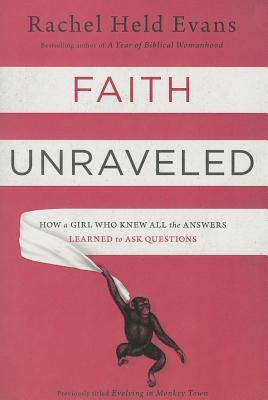
I wish I’d had this book ten years ago. I had questions the church couldn’t answer, and it was wrong to even ask them. Things in the fundamentalist sphere didn’t line up for me, but it was the only thing I knew, so I assumed I was just missing something. I wasn’t smart enough, or spiritual enough, or didn’t do enough for God. Though I’m past that initial questioning stage, I recognize the fear and curiosity in Rachel’s story.
I’d described her as a “former fundamentalist” before reading any of her material, but I think I’m wrong. I was waiting to hear where she’d ended up, what church was finally her church, but the answer never came. Maybe it’s better that way. This isn’t a conversion story—it’s a book of questions. It questions the things you’ve been told to accept. It questions the fundamentalist interpretation of Scripture. It questions where she belongs in this church, but she never quite leaves this church. She just tries to make sense of it, which I can respect.
Even when Jesus hung on the cross, when God had been insulted to the highest degree imaginable, left naked, humiliated, beaten, and bruised, he said, “Father, forgive them for they know not what they do.”
We had a lot of the same doubts: Like, it doesn’t seem possible that Baptists are the only ones in Heaven. Or, how can people who’ve never been exposed to the Gospel be saved? She realizes there’s a lot of focus on the afterlife and not much focus on this one, a theme that always unsettled me. She spends a lot of time trying to unravel these doubts, so I’d expected a big reveal at the end. The last section is titled “Change,” after all, so I was waiting for her grand answers. But there are no grand answers. Slightly disappointing, but also realistic. Any 20-something who claims to have all the answers is either delusional or a liar. The point of this book isn’t to lecture—it’s simply to explore.
It reads like one big blog post, understandable from someone who started as a blogger. It’s often entertaining, especially when she tells stories of the church’s evangelization efforts. (It’s all so… familiar.) I recall my own frustrations when she’s told “Be careful of what you say” when asking questions, and I laughed when she described the altar call and the droning “Just As I Am” in the background. This is someone who knows something is off, even if she can’t describe it.
Rachel was around my age, and died in 2019. Knowing this threw me into a weird loop as I was reading. She certainly knows the answers now, and it feels like I can just call her up and ask. I hope she knows the impact she’s had on many questioning fundamentalists.
The problem with fundamentalism is that it can’t adapt to change. When you count each one of your beliefs as absolutely essential, change is never an option.
